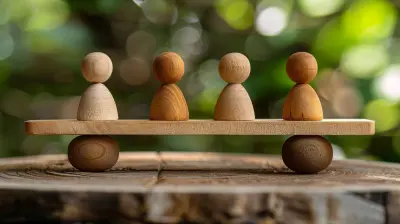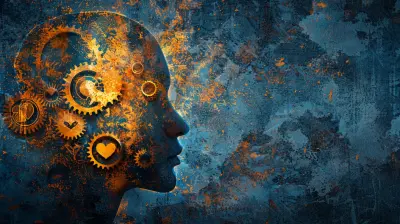Healing Through Emotional Growth: A Journey to Self-Empowerment
7 November 2025
We all go through stuff. Heartaches, setbacks, moments that knock the wind out of us. Maybe it’s a tough breakup, a job loss, a messy family dynamic, or just waking up one day and realizing, “I don’t feel like myself anymore.” It’s easy to get stuck. But here’s the truth — healing doesn’t come from avoiding the pain. It comes from growing through it. This is where emotional growth steps in.
In this post, we’re diving deep into emotional growth — what it is, how it fuels healing, and why embracing it could be the most powerful step toward self-empowerment you ever take.
What Is Emotional Growth?
Let’s start with the basics.Emotional growth is the process of becoming more aware of your emotions, understanding how they work, and learning how to handle them in healthy ways. It doesn’t mean you never feel down again — it just means you learn not to let those emotions rule your life.
Think of it like building a toolbox. Every time you learn a new skill, like setting a boundary or recognizing a trigger, you’re adding another tool. Over time, you become better equipped to handle life’s ups and downs.
Why Healing Requires Emotional Growth
So, why do healing and emotional growth go hand in hand?Because healing isn’t just about feeling better — it’s about becoming better. It's not about pretending you're okay when you're not. It’s about doing the hard, uncomfortable inner work to get to a place where you're truly okay — even when life gets messy.
Imagine trying to heal a broken bone without resetting it properly. You might cover it up, but it won’t function like it used to. The same goes for emotional wounds. You have to realign things, go deep inside, and grow through what you go through.
The Journey Begins: Acknowledging the Pain
Alright, this is the part no one loves to talk about — sitting with your pain.But here’s the thing: emotional growth starts with honesty. You can’t grow past something you’re not willing to confront.
It’s okay to say, “I’m not okay.” Maybe you’ve been avoiding your feelings for years. Maybe you've been numbing them with work, scrolling endlessly on your phone, or people-pleasing to avoid conflict. But healing starts with awareness. You can't fix what you won’t face.
Take a minute. Breathe. Ask yourself: What am I feeling? Where did this start? What am I afraid of?
You don’t need answers right away. Just be brave enough to ask the questions.
Self-Awareness: Meeting Yourself Where You Are
Once you’ve acknowledged the pain, the next step is self-awareness. And no, this doesn’t require sitting cross-legged on a mountain chanting “om” (unless that’s your thing).Self-awareness means noticing your patterns. Do you tend to shut down when you're hurt? Get defensive? Blame others? Over-explain? These responses are likely old survival mechanisms. They served you once — maybe as a child, maybe in a toxic relationship — but they’re not helping you now.
When you start noticing your emotional patterns, you give yourself the power to change them.
Rewriting the Story: Challenging the Inner Critic
Do you ever hear that voice?The one that says:
- “You’re not good enough.”
- “You always mess things up.”
- “Why even try?”
That's your inner critic — and it's loud. But emotional growth involves learning to question that voice.
You were never meant to believe those thoughts. Chances are, they didn’t even belong to you. They came from someone else — a critical parent, a harsh teacher, society’s unrealistic standards.
Start flipping the script. When that voice shows up, ask: “Is this true?” and “Would I talk to a friend this way?”
Challenging your inner critic is like standing up to a playground bully. At first, it’s scary. But eventually, the voice gets quieter. You get stronger.
Boundaries: The Ultimate Form of Self-Respect
Let’s talk boundaries. Not the “putting up walls” kind — but the healthy, loving kind that say: “I care about me enough to protect my peace.”Setting emotional boundaries is a massive part of emotional growth. It means recognizing what drains you, what triggers you, and what crosses the line — and then communicating that clearly.
It’s not easy. Especially if you’ve spent your life being the “fixer” or “people pleaser.” But trust me, boundaries aren’t selfish. They’re empowering. They free you up to love others better — without losing yourself in the process.
Emotional Regulation: Feeling Without Falling Apart
Ever feel like your emotions are running the show? Like you're just riding a rollercoaster of highs and lows?That’s completely normal. But with emotional growth, you learn how to ride the waves — instead of getting knocked over by them.
Here are a few tools that help:
- Name it to tame it: Just labeling your emotions (anxiety, sadness, frustration) can take away their power.
- Breathe: Literally. Deep, slow breaths activate the part of your brain that calms you down.
- Pause before reacting: Create a gap between emotion and action. That tiny pause can change everything.
You’ll still feel things deeply, but you’ll handle them differently. That’s growth.
Letting Go of Past Wounds
Okay, this one’s huge.A lot of people stay stuck because they’re still carrying pain from the past. Maybe your childhood was chaotic. Maybe someone betrayed you. Maybe you lost someone and never fully grieved.
Letting go doesn’t mean forgetting. It doesn’t mean what happened was okay. It means choosing not to let the pain control you anymore.
You can honor your story without being defined by it. That’s when healing becomes liberating. When your past becomes a page – not the whole book.
Reconnecting With Your Values
Healing through emotional growth often leads you back to yourself — the real you, not the version shaped by trauma or expectations.Ask yourself:
- What truly matters to me?
- What brings me joy?
- What do I want to stand for?
This is where self-empowerment takes root. When you know your values, you stop seeking validation. You stop apologizing for who you are. You start living in alignment with what makes you feel alive.
That’s powerful. That’s freedom.
The Role of Self-Compassion
Let’s not forget one of the most important pieces: being kind to yourself.Healing isn’t linear. Some days, you’ll feel strong and unstoppable. Other days, you’ll feel like you're back at square one. That’s okay.
Talk to yourself like someone you love. Show yourself grace on the hard days. Celebrate the baby steps — they count too.
Self-compassion isn’t weakness. It’s strength in softness. It’s the voice that says, “You’re doing the best you can, and that’s enough.”
Building a Support System
You weren't meant to heal alone.Whether it’s a therapist, a trusted friend, a spiritual mentor, or an online community — connection is essential. Healing happens in safe spaces. In conversations where you feel seen and heard.
So reach out. Speak up. Find people who aren’t afraid of your mess. You’ll be amazed how many others are on this journey too — quietly growing, just like you.
Celebrating Your Growth
Pause for a moment and reflect… look at how far you’ve come.Maybe you’re still figuring things out. Maybe you’re not “healed” yet. But you’re here. Reading this. Doing the inner work. That counts for something — a lot, actually.
Celebrate your growth — not just the big breakthroughs, but the quiet wins:
- The day you said no without guilt.
- The time you cried and let the tears just fall.
- The moment you chose yourself, even when it was hard.
That’s growth. That’s healing. That’s empowerment.
Final Thoughts: Your Journey, Your Power
Healing through emotional growth isn’t a destination — it’s a journey. And like any journey, it takes time, effort, patience, and a whole lot of courage.But the transformation? It’s worth every step.
When you grow emotionally, you don’t just heal old wounds — you build a new relationship with yourself. One rooted in self-awareness, compassion, strength, and purpose.
You become your own safe place. You learn to trust yourself again. You stop just surviving — and start thriving.
And that, my friend, is what self-empowerment is all about.
Keep going. You’re doing better than you think.
all images in this post were generated using AI tools
Category:
Emotional GrowthAuthor:

Gloria McVicar
Discussion
rate this article
1 comments
Fleur McLaughlin
This article beautifully highlights the transformative power of emotional growth in the journey of self-empowerment. By embracing vulnerability and fostering self-awareness, individuals can unlock their potential and cultivate resilience, ultimately leading to deeper connections and lasting fulfillment in life.
November 14, 2025 at 4:07 AM

Gloria McVicar
Thank you for your thoughtful comment! I'm glad the article resonated with you and highlighted the importance of emotional growth in self-empowerment.


